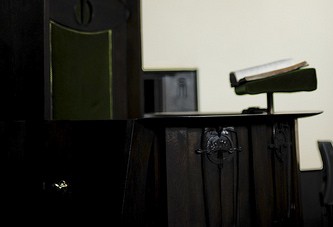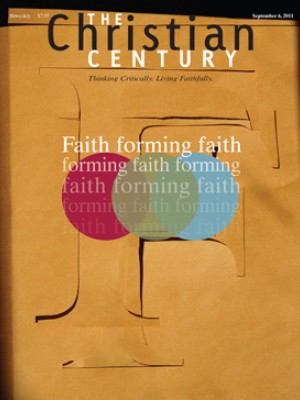Why sermons bore us
Like other teachers of preaching, I listen to a lot of sermons, sometimes a dozen in a single day. I have noticed that this fact rarely evokes covetous sighs from my faculty colleagues, many of whom imagine a daily regimen of multiple homilies as akin to endless trips to the periodontist.
Contrary to expectations, though, I find that helping students preach for the first time carries the excitement of teaching skydiving to beginners. There is always that telltale widening of the eyes as they stand in the open bay of the pulpit feeling the wind whip by, staring into the depths below and suddenly becoming aware of what they are about to do as you tap them on the shoulder and say, "Go!"
Read our latest issue or browse back issues.
Classroom adventures notwithstanding, for many people the words boredom and sermon are a proper pair, like horse and carriage. Pulpit search committees almost always top their wish lists with "good preacher" and report that their searches lead them through dry and waterless places. Last year, Monsignor Mariano Crociata, secretary-general of the Italian Bishops' Conference, made a splash on the pages of the Vatican's L'Osservatore Romano when he slammed dull preachers. "Too often," he complained, "sermons are just boring mush."
News? Maybe, but it's old news. In his book Preaching for Today, Clyde E. Fant surveys church history for attitudes toward sermons and finds the centuries littered with complaints about sermonic humdrum. When a woman in the Middle Ages was rebuked from the pulpit for gossiping, she mounted a counterattack. Pointing at the preacher, she retorted, "Indeed, sir, I know the one who's been doing the most babbling!"
The intriguing puzzle to me is not why centuries of churchgoers have carped about boring sermons, but why it is that sermons often seem so much more boring than they really are, objectively measured. It's been said that 99 out of 100 people are interesting once you get to know them, and the one who's not is interesting by virtue of being the exception. So it is for sermons. It is actually rare to find a sermon completely devoid of inspiration or creativity, yet sermon has become a word like politics, a noble term with a tarnished reputation. People who remain alert through an NPR report on agricultural reforms in the Sudan or who are all eyes and ears for a half-hour pitch on QVC for zircon earrings become testy the moment a sermon overflows the banks of their endurance.
Why?
Some might say that the sermonic genre has outrun its usefulness. It's too hierarchical, too linear and too slow for a fast-paced, visually oriented Twitter and Google+ culture. That argument might be persuasive if charges of preaching's obsolescence hadn't been raised and dropped so often over the years. Also, there is the curious fact that the American sermon, after gradually shrinking for decades to fit diminishing attention spans, is getting a bit longer nowadays, and it is the electronically savvy churches with their longer teaching-oriented "messages," so appealing to the wireless generation, that are beefing up the average.
Ironically, much of the snickering about boring sermons comes not because we expect so little but because we have hoped for so much. Barth once described preaching as happening in the context of one urgent question hanging in the air: "Is it true? Is God present?" Perhaps more muted in our time than in Barth's, the question nevertheless endures, and a deep hunger persists for a word from beyond us, a word from the Lord, a word that can gather us up and transform us, a trustworthy word, a word that can both judge the increasingly slippery and deceptive words of our public discourse and call our shared language to more redemptive purposes.
If there is no such word, then we are left to ourselves—our boring selves. Walter Benjamin once recounted the story of a 19th-century Paris neurologist whose patient was complaining of boredom, of a debilitating ennui. The physician performed a thorough physical examination. "There's nothing wrong with you," pronounced the doctor. "Just try to relax—find something to entertain you. Go see Deburau some evening, and life will look different to you," said the physician, referring to a popular French comic and mime.
"Ah dear sir," responded the patient. "I am Deburau."
We are all Deburau, weary of our own amusements. We joke about boring sermons, but often it is we who are boring—and bored. We say that sermons have bored us when actually they have disappointed us, failing to be the alternative word we need, failing to be the speech that arises not from our own meager entertainments but from the life of the Spirit. "We are bored," said Benjamin, "when we don't know what we are waiting for." One thing we are waiting for is for preachers who feel the strong wind, who sense the heights above them and the abyss below and take a deep breath and preach a life-changing gospel.






